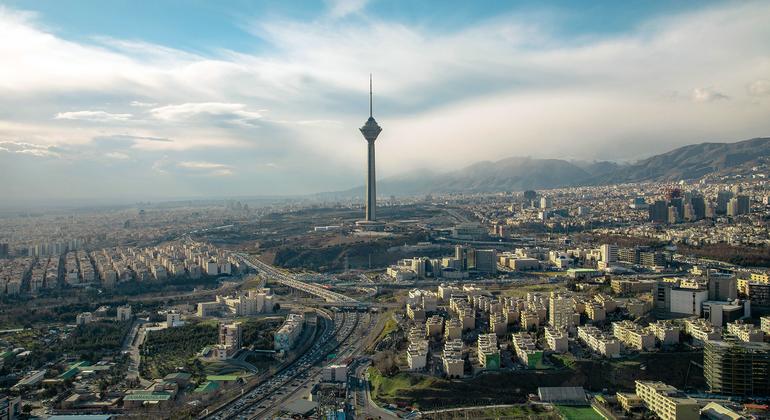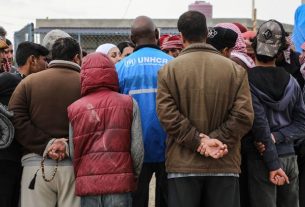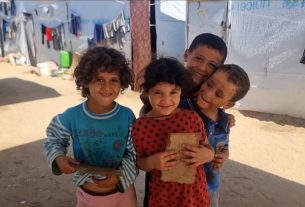Briefing at UN Headquarters in New York – the first time the mission has presented findings to the General Assembly – chairperson Sara Hossain said that conditions have deteriorated since the Israeli airstrikes, which reportedly killed over 1,000 people.
According to Iranian Government figures, 276 civilians, including 38 children and 102 women, were among the dead, and over 5,600 individuals were injured. Civilian infrastructure, including medical facilities and schools, suffered damage.
The Government also reported that the notorious Evin Prison in Tehran was hit without warning.
Iranian Red Crescent teams search for survivors after Israeli airstrike.
Around 80 people, including prisoners, family members (the attack took place during visting hours), staff and at least one child were killed. The prison housed around 1,500 inmates at the time, among them many human rights defenders and activists.
Ms. Hossain also expressed alarm at Iran’s response, which included missile strikes against Israel, which authorities said left 31 dead and over 3,300 injured.

Sara Hossain, Chair of the UN Independent International Fact-Finding Mission on Iran, briefs the United Nations Human Rights Council.
‘Systemic attack against a civilian population’
The aftermath of the strikes, she said, led to a domestic crackdown by the Iranian Government which has further eroded respect for the right to life.
The Human Rights Council-appointed investigators have documented the arrest of thousands of people, including lawyers, journalists, human rights defenders, and those expressing their views on the conflict on social media.
This year has seen a rise in executions in Iran, to the highest recorded level since 2015.
Most death penalty cases investigated by the mission appear to contravene international human rights law. Legislation was passed expanding the use of the death penalty for “espionage,” and criminalising the posting of content on social media that the Government deems “false information.”
“If executions form part of a widespread and systemic attack against a civilian population, as a matter of policy, then those responsible – including the judges who impose capital punishment – may be held accountable for crimes against humanity,” said Fact-Finding Mission rights expert Max du Plessis.
The recent crackdown has also affected ethnic and religious minorities, with over 330 Kurds and large numbers of Arabs arrested, and hundreds of thousands of Afghans deported, investigators reported.
Members of the Baha’i religious minority have been accused of being “Zionist spies” and some were arrested in house raids, with their property confiscated.
Impunity for ‘honour killings’
The persistence of other grave forms of violence, including the cases of femicide (the intentional killing of women and girls because of their gender) have been reported in recent months.
The Mission received credible information that there have been 60 such cases between March and September of 2025. “Honour killings” and other forms of gender-based violence, the mission reported, take place with impunity.
Businesses providing services to women refusing to comply with the mandatory hijab laws have reportedly been closed, and surveillance has allegedly intensified. Reports also indicate that the “morality police” have recently returned to patrol the streets.
The Fact-Finding Mission has documented increasing cases of transnational repression, including interrogation, threats, and surveillance of families of Iranian journalists abroad. It has received credible information indicating that more than 45 media workers in seven countries have faced credible threats.
“The acts of denying justice are not neutral,” Ms. Hossain said. “Failure to address injustice prolongs the suffering of victims and undermines the State’s obligations under international human rights law to ensure accountability, truth, justice, and reparations.”
‘Rights to life and liberty under unprecedented threat’
In her report to the General Assembly, the independent human rights expert on Iran, Mai Sato, condemned the strikes by Israel and the US as unlawful uses of force in violation of the UN Charter, whilst expressing deep concern that the end of the hostilities had brought no relief to the people of Iran.
“External aggression has fuelled deeper internal repression,” she said. “The Iranian people’s rights to life and liberty are under unprecedented threat.” Ms. Saito described the rise in executions as a deliberate policy of fear and retribution, noting that many executions followed unfair trials or vague national security charges.
The Special Rapporteur – who is not a UN staffer and receives no salary for her work – also highlighted a growing pattern of transnational repression, with Iranian authorities targeting dissidents abroad through intimidation, surveillance, and threat, and appealed to other UN Member States to support at-risk Iranian civil society actors, and coordinate efforts to counter transnational repression.



